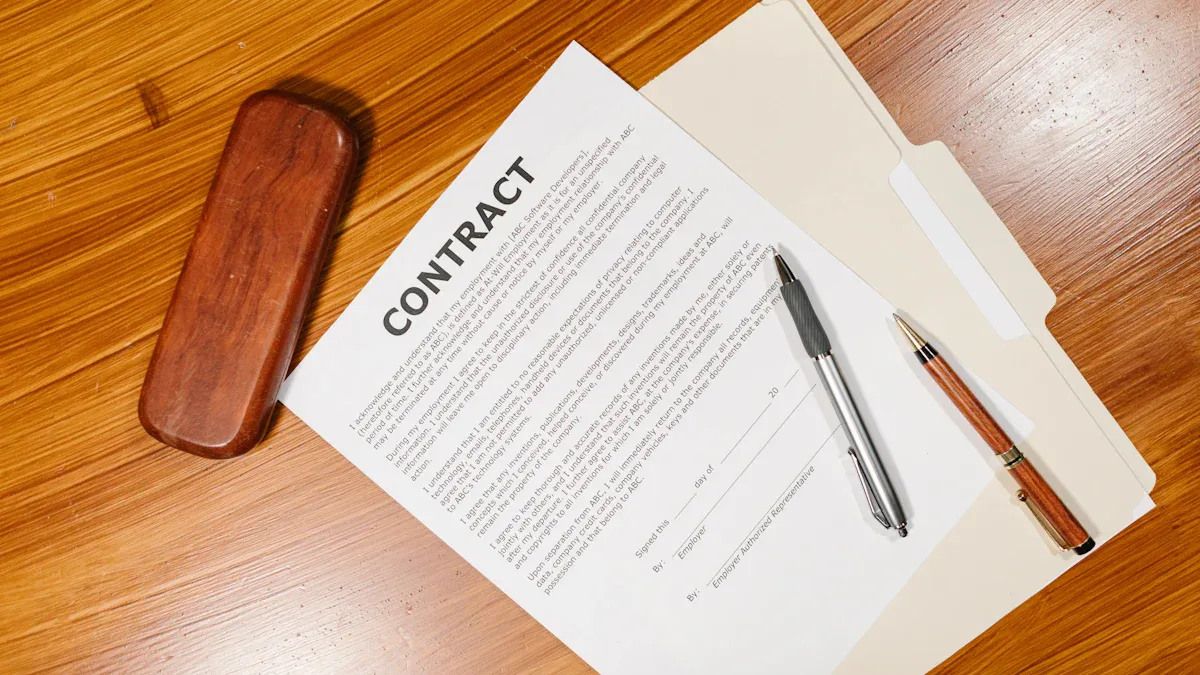Image Source: pexels
How to Use Online Reviews to Select Quality Personal Injury Lawyer: Online reviews serve as a valuable resource for evaluating personal injury lawyers. With 65% of individuals depending on reviews to guide their hiring decisions, these reviews provide essential insights into a lawyer’s responsiveness, empathy, and track record of success. By learning how to use online reviews effectively, you can pinpoint reliable professionals and steer clear of costly errors in your legal process.
Key Takeaways
- Online reviews are important for choosing personal injury lawyers. They show what clients think and help find reliable ones.
- Pay attention to clear and detailed reviews. Check for comments about communication, results, and how happy clients were.
- Use reviews along with other research. Check a lawyer’s background with bar groups and meet them to ask key questions.
Why Online Reviews Are Crucial for Selecting a Lawyer

Image Source: pexels
Evaluating a Lawyer’s Reputation Through Reviews
Online reviews play a pivotal role in shaping a lawyer’s reputation. They provide a snapshot of how previous clients perceive their services. Positive reviews often highlight qualities like professionalism, expertise, and successful outcomes, which can significantly boost trust. On the other hand, negative reviews can tarnish a lawyer’s image, deterring potential clients.
Did you know? 84% of consumers trust online reviews as much as personal recommendations. This means a lawyer with strong, positive feedback is more likely to attract clients and build credibility.
Here’s how reviews impact reputation:
- Positive reviews enhance trust and client satisfaction.
- Negative reviews can lead to reputational damage and fewer case acquisitions.
- 70% of individuals seeking legal counsel are willing to travel further for a lawyer with better reviews.
Understanding Client Experiences and Outcomes
Reviews offer a window into the experiences of past clients. They reveal how a lawyer handles cases, communicates with clients, and achieves results. For example, a review mentioning a lawyer’s responsiveness and empathy can indicate a client-focused approach. Conversely, reviews that highlight poor communication or unsatisfactory outcomes serve as red flags.
A significant portion of clients consult online reviews before choosing legal services. This trend underscores the importance of understanding client experiences to make informed decisions.
The Accessibility and Convenience of Online Reviews
Online reviews are incredibly accessible, making them a convenient tool for evaluating lawyers. Platforms like Google, Yelp, and Avvo allow you to browse reviews anytime, anywhere. This ease of access empowers you to compare multiple lawyers without leaving your home.
| Statistic | Description |
|---|---|
| 75% | Individuals seeking an attorney used online resources in the last year. |
| 65% | Consumers say reviews influence their decision to hire a lawyer. |
By leveraging these platforms, you can quickly identify lawyers who align with your needs and expectations.
How to Use Online Reviews to Select Quality Personal Injury Lawyer
Identifying Authentic and Detailed Reviews
When reading online reviews, focus on those that provide specific details about the lawyer’s services. Authentic reviews often mention particular aspects of the case, such as how the lawyer communicated or handled challenges. Look for reviews that describe the timeline, outcomes, and overall experience. These details help you understand the lawyer’s strengths and weaknesses. Avoid reviews that are overly vague or generic, as they may not reflect genuine client experiences.
Tip: Reviews with clear examples of successful case outcomes or challenges resolved effectively are more reliable indicators of quality.
Recognizing Balanced Feedback and Patterns
Balanced reviews often provide the most accurate picture of a lawyer’s performance. Pay attention to reviews that highlight both positive and negative aspects. For example, a review might praise the lawyer’s expertise but mention delays in communication. Consistent patterns across multiple reviews, such as frequent mentions of professionalism or responsiveness, can help you identify recurring strengths or weaknesses. Avoid basing your decision on a single glowing or critical review.
Avoiding Fake or Misleading Reviews
Fake reviews can mislead you into choosing the wrong lawyer. To spot them, look for vague language or overly generic descriptions. Check the reviewer’s profile for signs of inauthenticity, such as a newly created account or lack of activity. Use tools like Fakespot or ReviewMeta to analyze reviews for suspicious patterns. Regularly monitor reviews to identify inconsistencies or sudden spikes in feedback.
| Method | Description |
|---|---|
| Generic descriptions | Look for vague language that lacks specifics about the product, service, or experience. |
| Reviewer history | Check the reviewer’s profile age and activity to identify newly created or inactive profiles. |
| Consistent monitoring | Regularly review customer feedback to catch suspicious patterns early and set up alerts. |
| Fake Review Checker | Use tools like Fakespot and ReviewMeta to analyze reviews for patterns indicating inauthentic behavior. |
By learning how to use online reviews to select quality personal injury lawyer, you can avoid falling for fake reviews and make a more informed decision.
Key Indicators in Positive Reviews

Image Source: pexels
Communication Skills and Responsiveness
When selecting a personal injury lawyer, communication is key. Positive reviews often highlight lawyers who respond promptly to inquiries and keep clients informed throughout the process. You want a lawyer who listens to your concerns and explains legal terms in a way that’s easy to understand. Reviews mentioning quick email replies or regular updates about case progress indicate strong communication skills.
Tip: Look for reviews that describe how the lawyer handled unexpected challenges. This shows their ability to adapt and maintain clear communication under pressure.
Evidence of Successful Case Outcomes
Positive reviews frequently mention successful case results. These outcomes reflect the lawyer’s expertise and ability to secure favorable settlements or verdicts. Pay attention to reviews that detail the compensation clients received or how the lawyer negotiated with insurance companies. Specific examples of resolved cases can give you confidence in their track record.
For instance, a review might state, “The lawyer helped me win a settlement that covered all my medical bills and lost wages.” Such feedback demonstrates the lawyer’s ability to deliver tangible results.
Professionalism and Empathy in Client Interactions
Professionalism and empathy set exceptional lawyers apart. Reviews often describe how a lawyer treats clients with respect and genuinely cares about their well-being. You’ll find testimonials like, “I never felt like just another case. They cared about my well-being and supported me every step of the way.” Another client might share, “They didn’t just handle the legal aspects; they understood how my situation affected my family.”
These qualities matter because personal injury cases can be emotionally taxing. A lawyer who combines professionalism with compassion can make the process less stressful for you.
Verifying Reviews with Additional Research
Cross-Referencing with Bar Association Records
You should always verify a lawyer’s credentials through your state’s bar association. These records confirm whether the lawyer is licensed to practice and if they have faced any disciplinary actions. This step ensures you’re not relying solely on online reviews, which may not always tell the full story.
Tip: Visit your state’s bar association website and search for the lawyer’s name. Look for details like their license status, years of practice, and any complaints filed against them.
Cross-referencing this information with online reviews helps you identify lawyers who are both reputable and qualified. If a lawyer has glowing reviews but a history of disciplinary actions, you may want to reconsider.
Checking Lawyer Credentials and Websites
A lawyer’s website can reveal a lot about their expertise and professionalism. Look for details about their education, certifications, and areas of specialization. A well-maintained website often reflects a lawyer’s commitment to their practice and clients.
-
Check for:
- Case studies or testimonials.
- Awards or recognitions.
- Clear explanations of their services.
Note: A lawyer who invests in a professional website likely values transparency and client trust. This is a good sign of their dedication to quality service.
Seeking Recommendations from Trusted Sources
Personal recommendations can complement online reviews. Ask friends, family, or colleagues if they’ve worked with a personal injury lawyer they trust. These firsthand accounts often provide insights you won’t find online.
Pro Tip: Combine personal recommendations with online research. This approach gives you a well-rounded view of the lawyer’s capabilities and reputation.
By verifying reviews with these additional steps, you can confidently choose a lawyer who meets your needs and expectations.
Taking Action After Reviewing Feedback
Narrowing Down Your List of Lawyers
After reviewing feedback, it’s time to create a shortlist of potential lawyers. Focus on those with consistently positive reviews that highlight their expertise, communication skills, and successful outcomes. Eliminate lawyers with recurring negative feedback or red flags, such as poor responsiveness or unprofessional behavior. Aim to narrow your list to three to five candidates. This manageable number allows you to compare their qualifications and services more effectively.
Tip: Use a spreadsheet or notes app to organize your findings. Include details like review highlights, credentials, and any additional research you’ve conducted.
Scheduling Consultations to Ask Key Questions
Once you’ve finalized your shortlist, schedule consultations with each lawyer. Most personal injury lawyers offer free initial consultations, giving you the chance to evaluate their approach and compatibility. Prepare a list of key questions to ask during these meetings. For example:
- How much experience do you have with cases like mine?
- What is your success rate in securing favorable outcomes?
- How will you communicate updates about my case?
Pay attention to how the lawyer responds. Do they listen carefully and provide clear answers? A lawyer who values your concerns and explains the process thoroughly is more likely to meet your expectations.
Making a Final Decision Based on Research
After the consultations, review your notes and compare each lawyer’s strengths and weaknesses. Consider factors like their experience, communication style, and the confidence they inspire. Trust your instincts. If a lawyer seems genuinely invested in your case and aligns with your needs, they’re likely the right choice. By combining online reviews, consultations, and additional research, you can confidently select a quality personal injury lawyer.
Remember, learning how to use online reviews to select quality personal injury lawyer ensures you make an informed decision that benefits your case.
Online reviews are essential for finding a trustworthy personal injury lawyer. They reveal strengths, weaknesses, and client satisfaction. Studies show 97% of consumers rely on reviews before making decisions. Use this tool to identify lawyers with strong communication and proven results. Take the next step—schedule consultations and secure the representation you deserve.
FAQ
How do I know if a review is trustworthy?
Look for reviews with specific details about the lawyer’s services, communication, and case outcomes. Avoid vague or overly generic feedback, as it may lack authenticity.
Tip: Use tools like Fakespot to analyze reviews for credibility.
Should I rely solely on online reviews to choose a lawyer?
No, combine reviews with additional research. Verify credentials through bar associations, check their website, and schedule consultations to ensure the lawyer meets your expectations.
What platforms are best for finding lawyer reviews?
Google, Yelp, and Avvo are reliable platforms. They provide detailed client feedback and allow you to compare multiple lawyers based on ratings and reviews.
Pro Tip: Cross-reference reviews across platforms for consistency.




